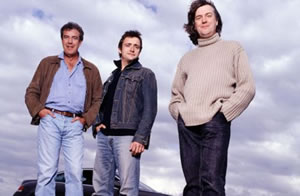Survey Sheds Light On Drivers’ Parking Behaviour
Science of parkology reveals Top Gear is in fact presented by a mouse, a scorpion and a chimpanzee
When it comes to parking why do many drivers behave like animals?
If you ever have wondered why some drivers are better at tracking down spaces than others or why some people always seem to get into arguments about parking, it’s because many motorists reveal their primitive animal state when hunting for a parking space.
Parking a car brings out a combination of the hunting and protective instincts in human behaviour. These findings are revealed in some innovative behavioural research which has spawned ‘Parkology – The science of parking’.
The research has been conducted by Park-Up.com, who runs a free online searchable database of car parks and on-street parking across London. It sheds new light on why some people are just better at parking than others. The survey was conducted among 1046 Londoners throughout April and June 2009.
Parking is the most stressful part of any journey and this stress frequently boils over into ‘Parking Rage’. The research classifies motorists’ parking behaviour into five groupings: Chimpanzees, Mice, Panthers, Scorpions and Sharks, the happiest and most successful of all being a chimpanzee. They are described below along with results of the survey.
Chimpanzee - They don’t monkey around when it comes to parking!
According to the study, 15% of London drivers exhibit chimpanzee behaviour when parking. Like our close cousins they are clever, inventive and flexible. They use a variety of different techniques to find that elusive space. When confrontation situations arise they tend to use charm and cheek rather than aggression. They are sociable and not too bothered by other drivers parking antics. However don’t park too close to them as they might turn nasty. They are also very confident about their parking skills. Chimpanzees are typically mostly men in their forties and fifties, and tend to drive BMW 3 series, Volvos and Ford Mondeos. Local resident and Top Gear's “Captain Slow” James May would most likely fall into this category.
Mice – This mouse won’t get trapped!
Research highlights that the majority of Londoners are mice. 37% of respondents were classified in this category. Mice tend to be passive, quiet and avoid confrontations. They tend to head straight for the less busy areas to park even if they have to walk a bit further. Avoiding confrontations and stressful situations at all cost they would rather give up their space than get into an argument. Despite them not being that confident about their parking skills, they are good at getting into small spaces. This category is typified by men and women over 50 and their typically drive small cars. Celebrity Mouse would be Top Gear presenter Richard Hammond.
Panther – Cool Kitty!
The second biggest group of London drivers are Panthers. The survey highlights that 25% of London drivers hunt for parking like panthers. If you’ve been followed back to your car by another driver, then you’ve been stalked by a panther. The main characteristic of this animal is its predatory behaviour: they stalk their parking spaces by driving around slowly waiting for someone that appears to leaving carrying bags or holding car keys. Their inconsiderate parking technique tends to cause slow moving tail backs behind them. Panthers will get their claws out in confrontations though this may be just verbal. Panthers are typified by men and women in their thirties, divorced with kids. They tend to drive saloons and sporty executive cars. Celebrity panther would be black cab owner and actor driver Stephen Fry.
Scorpion – Don’t get stung by one of these!
According to the research, 18% of London drivers are scorpions. Like the famously deadly animal, they are opportunistic, patient yet potentially dangerous. Scorpions tend to scuttle around until they find a desirable spot and wait.
Driving around randomly hoping to find a space is not for them. They tend to cause traffic jams because they wait in inconvenient areas. Once a scorpion sees a space, they move fast and dart in, quickly outsmarting any competition. Discretion is the better part of valour for scorpions as they will weigh up the opposition before entering any confrontation. The demographics identified them as predominantly female under 25. Typical scorpion cars are the super-minis, classic sports cars and hot-hatches. Celebrity scorpion would be Top Gear presenter Jeremy Clarkson.
Sharks – Be afraid, be very afraid!
Last but certainly not least are Sharks. They are the smallest category in the classification consisting of only 5% of London drivers. It’s said that sharks can sense minute concentrations of blood in the sea. These sharks can find a parking space in a sea of cars. However they have no scruples about getting that spot! They are opportunistic, predatory and aggressive; they circle car parks and streets on the prowl. Sharks are not averse to naughty tactics such as blocking off potential rivals, using threatening behaviour or intimidation (using the horn, glaring, verbal abuse). If all else fails they would have no qualms about parking in a disabled or a family bay. Most London sharks are men over 25 and typically drive large executive cars, SUV’s and vans. The obvious celebrity Shark would be Pete Doherty.
Norman Olaniran, Founder and Managing Director of Park-Up.com, says, “The serious point behind this research is that it can be used to simplify and de-stress the parking process. Car parks and local authorities could employ better signage to discourage irresponsible behavior of drivers behaving like sharks and scorpions. And if the next time you tempted race someone for that last space you remember that you are acting like a shark, it might just put a smile on your face."
June 17, 2009
Related links
|
